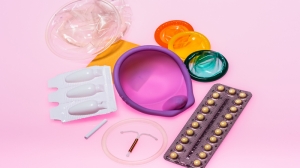Spermicides are chemical contraceptives that immobilize or destroy sperm before they reach the uterus. Although they are not known to be able to guarantee complete protection against unwanted pregnancies, spermicides continue to attract the attention of sexually active people. Therefore, it is worth emphasizing: a spermicide used separately should not be considered a really reliable method of contraception.
Spermicides are available as gels, creams, sprays , capsules, or tablets for insertion into the vagina. The best known spermicide is nonoxylon-9.
How does spermicide work ?
Spermicides work in two ways:
• violate the integrity of the sperm membrane;
• change the pH of the vagina (creating an unfavorable environment for spermatozoa).
How to use?
As mentioned above, spermicide does not provide satisfactory protection against unwanted pregnancy, so it is not recommended to use it alone as a first choice contraceptive method. In fact, it is estimated that this method does not work in 29%. Spermicide can be used in combination with other barrier methods of contraception, such as the diaphragm, which, given the Pearl index , is not a reliable method of contraception. (The Pearl Index indicates the reliability of a method of contraceptive practice.)
In this particular case, the diaphragm failure index fluctuates between 2 and 3 (versus 0.1 for birth control pills, where the risk of conception is very low, almost zero if the correct methods of application are followed).
Before the insertion of the diaphragm, spermicide must be applied directly inside the latex dome, exactly on the part that will be in contact with the cervix. Spermicide is also sometimes used by women who use the IUD as their preferred method of contraception.
Spermicides : pros and cons?
Before using any contraceptive method, you should consult your doctor. If you are faced with a choice, contact the specialists of the Bogolyuby Medical Center to find the best remedy for you.
Among the positive factors of the described method of protection against unwanted pregnancy, the following should be highlighted:
• spermicide is sold without a prescription;
• the introduction does not require the cooperation of a partner;
• does not have the typical side effects of hormonal contraceptives ;
• increases lubrication during intercourse.
What are the disadvantages of chemical contraceptives ? The use of spermicides can irritate or even damage the walls of the vagina, resulting in burning, itching, and a local rash. In women, frequent use of spermicides increases the risk of urinary tract infections, bacterial vaginosis , thrush.
Excessive use of spermicides increases the risk of contracting sexually transmitted diseases, since the vaginal wall becomes more susceptible to pathogenic influences by becoming irritated . Spermicide can cause allergic skin reactions in both partners.
What are the contraindications?
The use of spermicides is not recommended in the following cases: the presence of vaginal abnormalities that prevent the correct use of spermicide ; frequent sexual intercourse; the woman's age is under 30; frequent urinary tract infections; predisposition to the risk of contracting HIV; hypersensitivity to one or more components of the spermicide .



















